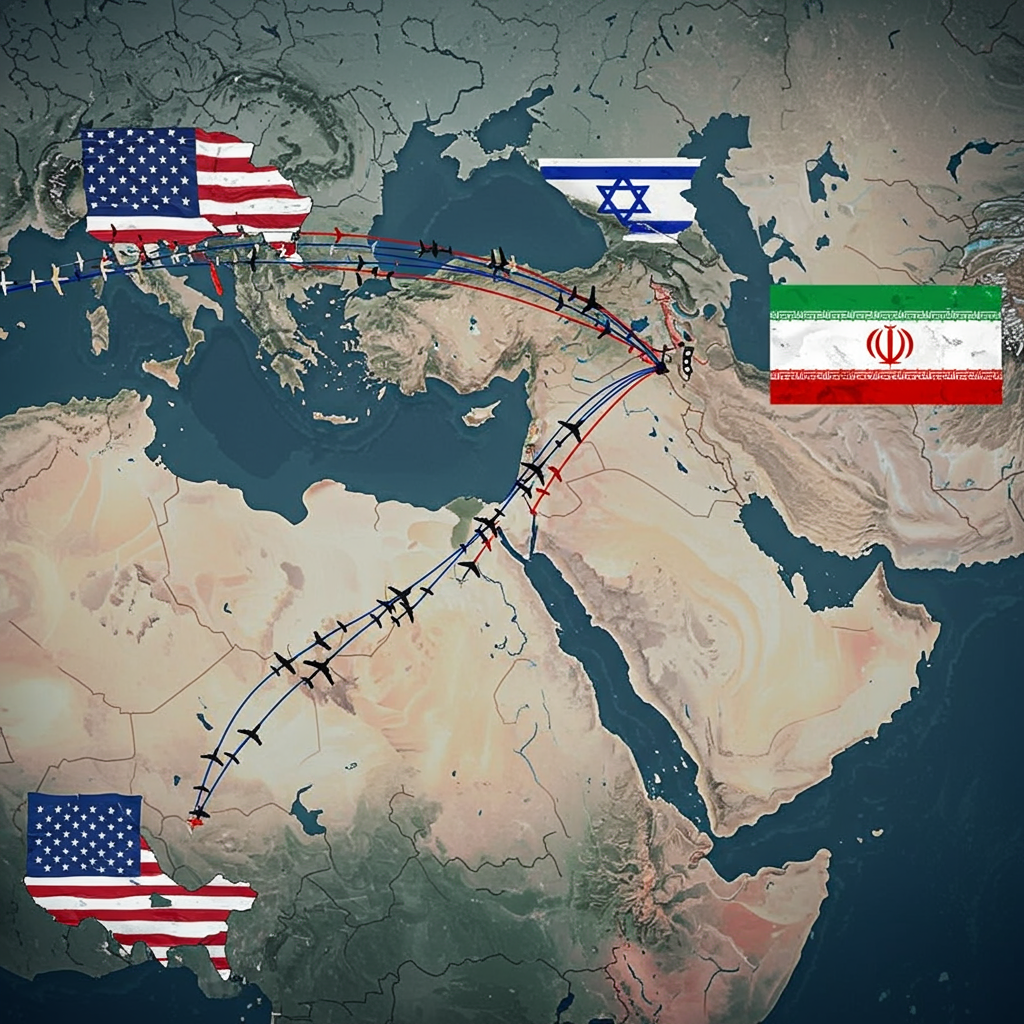Escalating geopolitical tensions across the Middle East, particularly involving the United States, Israel, and Iran, are causing significant disruption to commercial air travel in the region. Airlines are actively adjusting their operations, leading to widespread flight cancellations, reroutes, and airspace closures driven primarily by critical safety concerns.
This volatility impacts not only direct travel to destinations within the Middle East but also journeys that rely on the region’s critical air corridors, which serve as vital transit points connecting Europe and Asia. With airspace over Russia and Ukraine already restricted for many carriers, the Middle East has become an even more essential, albeit now precarious, bridge for long-haul international flights.
Why Middle East Airspace is Crucial
The skies above countries like Iran, Iraq, Syria, Jordan, and the Gulf states sit on the most direct East-West flight paths. Disruptions here force airlines to take lengthy detours, typically routing either north over areas like Georgia and Central Asia or south via Saudi Arabia and the Arabian Sea. These reroutes aren’t just inconvenient; they significantly increase flight times, burn more fuel, drive up operational costs, and present challenges for managing crew duty limits.
Airlines Taking Action: Cancellations and Reroutes
In response to the heightened risk environment, numerous international and regional carriers have announced significant changes:
Major Suspensions: Airlines including British Airways, Air France-KLM, Lufthansa Group (Lufthansa, Swiss, Austrian, ITA), Singapore Airlines, Emirates, FlyDubai, Qatar Airways, Etihad Airways, Turkish Airlines/Pegasus, and SalamAir have suspended or significantly reduced services to affected countries like Iran, Iraq, Syria, Lebanon, Jordan, and Israel.
Airspace Avoidance: Many airlines, including Lufthansa Group and Finnair, are actively avoiding flying through Iranian, Iraqi, Israeli, and Syrian airspace altogether.
Hub Impacts: Major connection hubs like Dubai (served by Emirates, FlyDubai, United) and Doha (Qatar Airways, British Airways, Finnair, American Airlines) have seen temporary suspensions and reroutes, impacting global connectivity.
US & Canadian Carriers: United Airlines, American Airlines, and Air Canada are among those that have suspended specific routes to the region or offered passengers flexible rebooking options.
Alternative Routes: While traffic is minimal over the most affected conflict zones, airspace over Saudi Arabia has reportedly become a “new backbone” for East-West traffic, absorbing many displaced flights. Other routes via the Caspian Sea, Afghanistan, and the Red Sea are also seeing increased usage.
Airspace over several countries, including Iran, Iraq, Jordan, Qatar, and Israel (Ben Gurion airport saw closures and limited “rescue flights”), has been subject to full or partial closures.
Safety is the Driving Force
Decisions to suspend or reroute flights are rooted purely in safety assessments. Airline industry experts emphasize that “Safety of flight is paramount” and that if a situation presents a “pure safety of flight issue, you don’t go. Period.”
Global aviation safety bodies like Safe Airspace have issued alerts highlighting increased risks to commercial aircraft due to ongoing missile and drone activity. The region has a tragic history of aviation incidents linked to military tensions, including the accidental downing of Iran Air flight IR655 in 1988 and a Ukrainian passenger jet in 2020.
Beyond direct attack risks, there’s growing concern over navigation interference. Geopolitical hotspots are increasingly seeing GPS jamming and location spoofing, where ground-based systems broadcast incorrect positions, potentially sending aircraft off course. Experts have observed a dramatic increase in such activity over the Persian Gulf recently, affecting numerous aircraft.
What Travelers Need to Know and Do
For anyone planning to fly to or through the Middle East, vigilance and preparation are essential:
- Check Directly with Your Airline: The most critical step is to contact your airline frequently for the latest status updates on your specific flight. Schedules are fluid and can change rapidly.
- Consult Travel Advisories: Monitor advisories from your country’s foreign affairs department (e.g., the U.S. State Department). They provide risk assessments, often with specific recommendations for countries. The U.S. State Department has issued a Worldwide Caution advising increased caution for U.S. citizens abroad and notes potential for demonstrations against U.S. interests. They are generally risk-averse, offering a good barometer of potential risks.
- Stay Informed: Follow news from credible sources regarding the situation in the region.
- Prepare for Disruptions: Be ready for potential delays, reroutes, or cancellations. Longer journey times are likely for flights avoiding affected airspace.
- Review General Safety Tips Abroad: In potentially volatile regions, basic travel safety tradecraft is crucial. This includes:
Keeping digital and paper copies of important documents.
Registering with your embassy (like the U.S. State Department’s STEP program).
Researching the local geopolitical situation.
Maintaining situational awareness in public spaces.
Being cautious about personal security at hotels.
Dealing with Flight Cancellations and Concerns
If Your Flight is Canceled: Under U.S. Transportation Department rules, if your airline cancels your flight, you are entitled to a refund.
If You Feel Unsafe but Flight Still Operates: If an airline is still flying to a destination but you feel uneasy due to the security situation, reach out to the carrier. While not legally mandated to refund you in this case, airlines may offer options like a travel credit or fee-based rebooking. Their desire to retain your business can sometimes lead to flexibility.
Understanding Travel Insurance Limitations
Travel insurance can provide valuable protection, but coverage limitations are critical to understand in conflict situations. Most standard travel insurance policies contain exclusions for war, acts of war, and political unrest. This means claims related to cancellations due to the conflict itself (especially if you choose to cancel based on general concerns) are unlikely to be covered.
While the conflict may not be covered, some policies might still offer coverage for disruptions resulting from the situation, such as significant flight delays or mandatory evacuations if specified in the terms. For travelers concerned about canceling for any reason, including fear related to conflict, some policies offer a “Cancel For Any Reason” (CFAR) benefit, but this typically costs significantly more, must be purchased early in the booking process, and only reimburses a portion (often 50-75%) of non-refundable costs.
The situation in the Middle East remains highly fluid. Travelers should prioritize safety, stay informed, and remain in close contact with their airlines and relevant government advisories.




